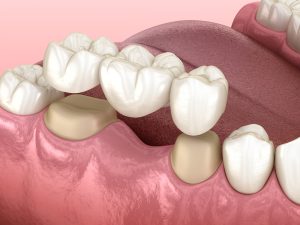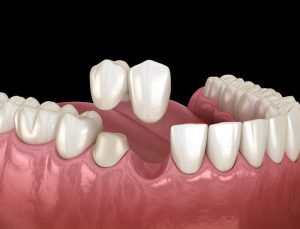Please note we may not offer every type of dental bridge mentioned. Call (425) 284-0515 to learn more.
Reclaim Your Smile: Comprehensive Dental Bridge Treatment in Kirkland
Missing teeth can affect more than just your appearance. They can impact your ability to chew comfortably, speak clearly, and even influence the alignment of your remaining teeth. Dr. Roberts, a top Kirkland dentist at Dentiste, understands these challenges and offers high-quality dental bridges to help patients reclaim their healthy smiles.
Call us today at (425) 284-0515 to schedule your consultation and learn how a dental bridge can transform your smile and your life. We also welcome patients in Redmond, Woodinville, and Bellevue.
Real Patient Reviews From Our Amazing Kirkland Patients
Don’t just take our word for it! Read some real patient testimonials for our dental office in Kirkland:
- “I used to be extremely fearful of interacting with any type of dental office or procedures. …The hygienist, Michelle, is exceptional. She and Dr. Roberts make you feel comfortable and confident. I actually had some scary issues with my gum health after quarantine that I have been able to reverse because I have been so encouraged and well-informed to take better care of my oral hygiene and related nutrition practices. I would recommend DENTISTE to any of my friends.”– Christine M.
- “Dr. Roberts is very kind and personable. Since we are coming from out of town, they try very hard to work with us on scheduling as well. I feel confident that we are getting good, quality dental care at Dentiste.”– Jennifer V.
Ready to share your own success story, or eager to start one? Call us at (425) 284-0515 to schedule your consultation with our Kirkland dental team!
What Are Dental Bridges?
A dental bridge is a prosthetic device designed to “bridge” the gap created by one or more missing teeth. It comprises one or more artificial teeth, known as pontics, which are held in place by dental crowns placed on the natural teeth or implants on either side of the gap. These anchoring teeth are called abutment teeth. Dr. Roberts meticulously crafts each bridge to blend seamlessly with your existing teeth, creating a natural-looking and functional restoration.
Types of Dental Bridges
While the traditional fixed bridge remains common, advancements in dental technology have introduced several types of bridges, each suited for different situations:
- Traditional Dental Bridge: This is the most common type, used when you have natural teeth on both sides of the gap. Crowns are created for the teeth on either side of the missing tooth (the abutment teeth), and a pontic (false tooth) is suspended between them.
- Cantilever Bridge: This type is used when there’s only one natural tooth available next to the gap. The pontic is supported by a crown on just one side. While an option, Dr. Roberts may discuss the potential for increased stress on the supporting tooth with this type. Cantilever dental bridges are not recommended in the back of your mouth due to the risk of putting too much force on your other teeth.
- Maryland Dental Bridge (Resin-Bonded Bridge): Maryland bridges use metal or porcelain “wings” on each side of the pontic. These wings are bonded to the backs of your existing teeth, rather than requiring crowns. This is a more conservative option, as it requires less alteration of adjacent teeth.
Financing Dental Bridges at Dentiste
We understand that investing in a dental bridge is an important decision for your health and confidence. At Dentiste, Dr. Roberts and our compassionate team believe that everyone deserves the opportunity to achieve a complete and comfortable smile.
The cost of your dental bridge will always be discussed with transparency. Since each smile is unique, your individual needs and the specifics of your treatment plan will determine the exact cost. The cost of dental bridges varies depending on the type of bridge selected and the area of the country where the procedure is done. Before any treatment begins, we will provide you with a clear breakdown of the expenses and discuss all your available payment options.
To discuss the cost of your dental bridge and explore your dental insurance coverage and other dental financing options, please contact us today. Your healthy, confident smile is within reach. Call Dentiste at (425) 284-0515 to schedule your consultation.
The Dental Bridge Procedure in Kirkland
The process of getting a traditional bridge at Dentiste in Kirkland typically involves a few appointments.
- Initial Consultation and Examination: Dr. Roberts will conduct a thorough examination of your teeth and gums, including X-rays, to determine if a dental bridge is the right solution for you. This is also an opportunity for you to discuss your goals and ask any questions you have.
- Tooth Preparation: During your next visit, Dr. Roberts will prepare the abutment teeth. This involves removing a small amount of enamel to make space for the crowns that will support the bridge. During the first visit, the abutment teeth must be reshaped to prepare them for crowns. Digital dental impressions of your teeth will then be taken and sent to a dental laboratory, where your custom bridge will be crafted. A temporary dental bridge will be placed to protect your prepared teeth and maintain aesthetics while your permanent bridge is being made.
- Bridge Placement: Once your permanent bridge arrives from the lab, you’ll return to Dentiste to have your temporary bridge replaced. Dr. Roberts will carefully check the fit, bite, and appearance of the bridge. If everything is satisfactory, the bridge will be permanently cemented into place. Dr. Roberts will provide you with instructions on how to care for your new bridge to maximize its longevity.
Candidacy for Dental Bridges
Dental bridges are an excellent option for many individuals missing one or more teeth. However, dental bridge candidacy depends on several factors, including the health of your remaining teeth and gums. The abutment teeth must be strong enough to support the bridge. During your initial visit to our Kirkland clinic, Dr. Roberts will thoroughly assess your oral health and discuss all available tooth replacement options, including dental implants, to help you make an informed decision that aligns with your needs and preferences.
For patients in Kirkland and beyond seeking reliable tooth replacement, Dr. Roberts provides comprehensive evaluations. Call (425) 284-0515 to schedule your consultation.
Benefits and Potential Risks of Dental Bridges
While the cosmetic improvement is often the first thing people notice, the benefits of a dental bridge extend far beyond a more appealing smile. With a dental bridge from Dr. Roberts at Dentiste, you can experience:
- Restored Chewing Function: Missing teeth make it difficult to properly chew food, leading to digestive issues and limiting your dietary choices. A bridge allows you to chew with renewed efficiency, enjoying a wider variety of foods.
- Improved Speech Clarity: Teeth play a vital role in articulation. Gaps can cause whistling sounds or difficulty pronouncing certain words. A bridge helps restore proper speech patterns.
- Maintained Facial Structure: While a bridge doesn’t stimulate the bone directly like an implant, it helps maintain the overall structure of your bite.
- Prevention of Remaining Teeth Shifting: By filling the void, a bridge prevents adjacent teeth from drifting into the empty space, which can cause misalignment and bite problems.
- Enhanced Self-Confidence: A complete, beautiful smile significantly boosts self-esteem, allowing you to interact socially and professionally with greater ease.

- Alteration of Natural Teeth: For traditional and cantilever bridges, the natural teeth on either side of the gap (abutment teeth) need to be prepared by removing some enamel to accommodate the crowns.
- Potential for Decay and Gum Disease: The margins where the bridge meets the natural teeth can become areas where plaque and bacteria accumulate if not meticulously cleaned. This increases the risk of tooth decay in the abutment teeth and gum disease around the bridge.
- Tooth Sensitivity: It’s common to experience some temporary tooth sensitivity to hot or cold temperatures after the abutment teeth have been prepared. This usually diminishes over a few weeks, but if it persists, it’s important to inform Dr. Roberts.
- Damage to Supporting Teeth: The abutment teeth bear the chewing forces of the artificial tooth (pontic). If these teeth are not strong enough or if there’s excessive force, they can become susceptible to fracture, decay, or other issues over time.
Caring for Dental Bridges
With proper care, a dental bridge can last for many years, often 10 to 15 years or even longer. A dental bridge can last 5-15 years before it needs to be replaced. Dr. Roberts emphasizes the importance of good oral hygiene to maintain the health of your bridge and the surrounding natural teeth.
- Brush Twice Daily: Use a soft-bristled toothbrush and fluoride toothpaste to clean your bridge and natural teeth. Pay special attention to the areas around the crowns and the pontic.
- Floss Daily: Flossing is crucial, especially underneath the pontic of the bridge. A floss threader or interdental brush can help you navigate these areas effectively. Dr. Roberts can demonstrate the proper technique.
- Regular Dental Check-ups: Consistent visits to Dentiste for professional cleanings and examinations are essential. These appointments allow Dr. Roberts to monitor the health of your bridge and detect any potential issues early.
- Avoid Hard and Sticky Foods: While bridges are strong, avoiding extremely hard candies, ice, or sticky foods can help prevent damage.
- Address Bruxism (Teeth Grinding): If you grind or clench your teeth, Dr. Roberts may recommend a custom nightguard from our Kirkland office to protect your bridge and natural teeth from excessive force.

